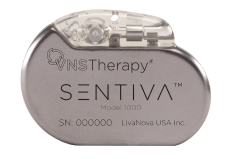The nerve to expect more.
The nerve to reimagine what’s possible.
Is VNS Therapy® right for you?
Take the AssessmentPeople with drug-resistant epilepsy should consider other non-drug treatment options, like VNS Therapy, to maximize their seizure control and overall quality of life
1 in 3 People with Epilepsy Can't Control Seizures with Medication Alone
Drug-resistant epilepsy is diagnosed when a person tries two or more prescribed medications without finding seizure freedom
After 2 medications have failed to control seizures, fewer than 1 in 10 patients achieve seizure freedom with a newly added medication
People with drug-resistant epilepsy should consider other non-drug treatment options, like VNS Therapy, to maximize their seizure control and overall quality of life

VNS (Vagus Nerve Stimulation) Therapy is an add-on treatment for drug-resistant epilepsy FDA-approved for people as young as four
VNS Therapy is A Proven Seizure Treatment Option for Drug-Resistant Epilepsy
VNS Therapy is smart device which sends mild pulses through the vagus nerve to areas in the brain in an effort to control seizures
VNS Therapy effectiveness improves over time with a 76% average reduction in seizures at 10 years
About 9 out of 10 people using
VNS Therapy experienced an overall improvement in their quality of life
Watch real people share their experiences and results with VNS Therapy.

“I've learned to start finding the beauty in everything and having VNS Therapy has made the biggest difference. I got my life back.”
– Aaron

"Her quality of life — it's changed. It's just miraculous. VNS Therapy
has been a lifesaver."
– Nicole, Vivien’s Mother
*These are the experiences of people who have tried VNS Therapy. Individual results may vary.
Is VNS Therapy right for you?
Take the AssessmentQuestion 1/4
VNS Therapy can be used in addition to medicine and other treatments. It is not a drug and does not have drug-related side effects.
Infection is the most common side effect of the procedure.
The most common side effects of VNS Therapy include:
- hoarseness
- shortness of breath
- sore throat
- coughing
These side effects generally only occur during stimulation & usually decrease over time.
© 2025 LivaNova PLC. All Rights Reserved.